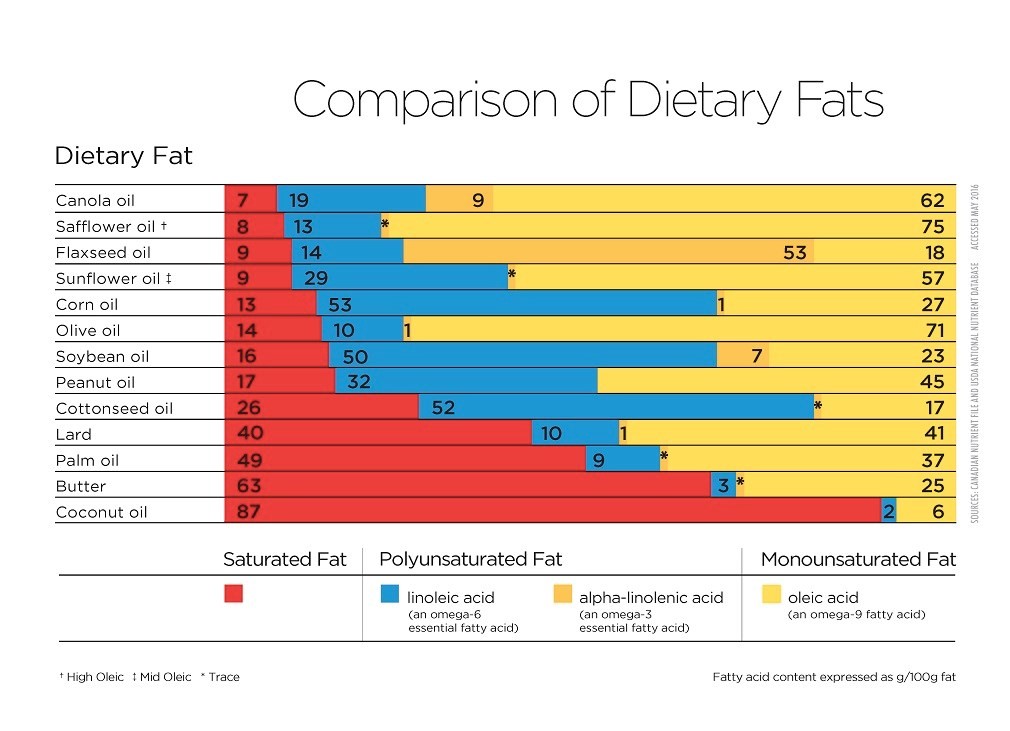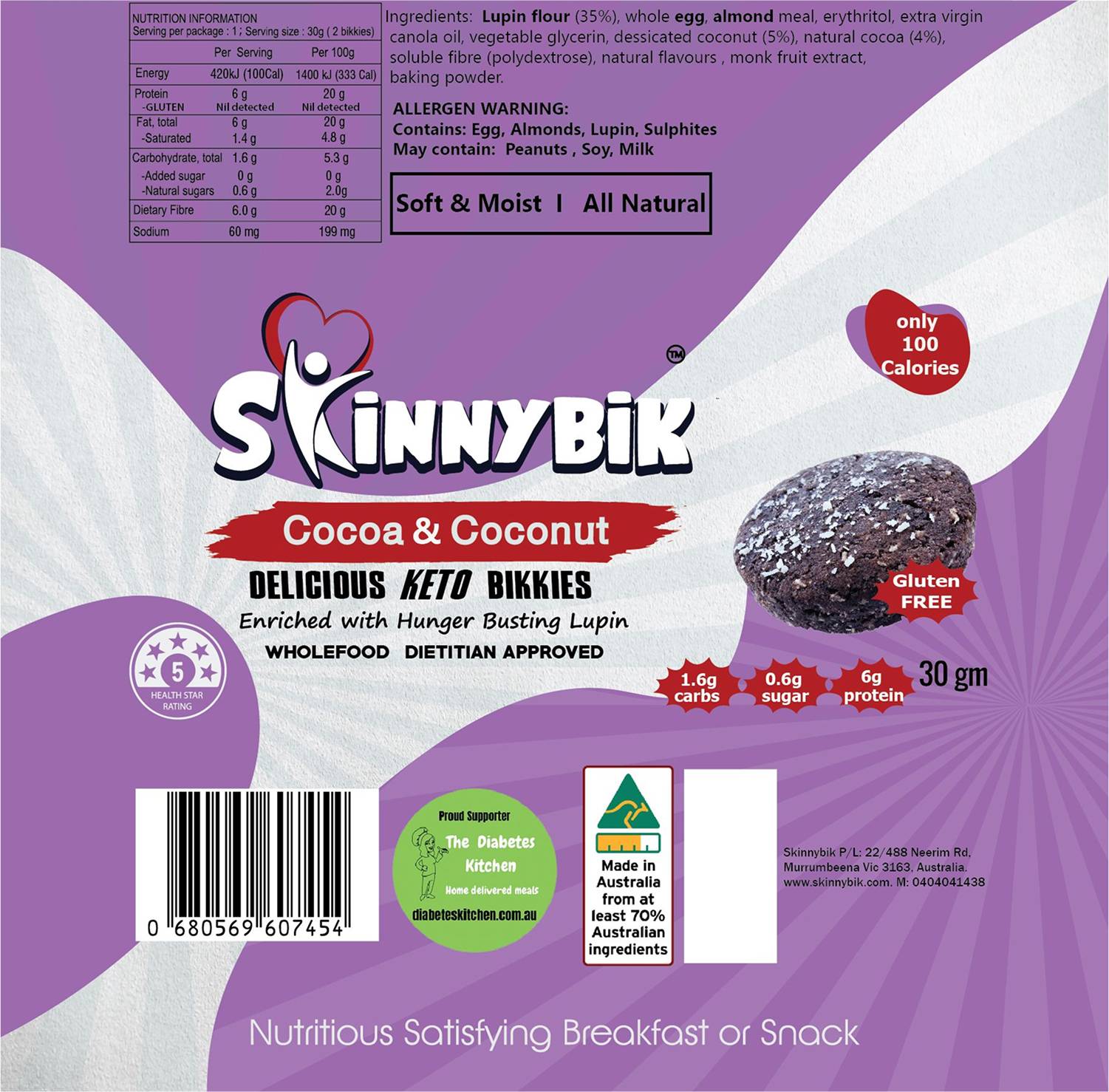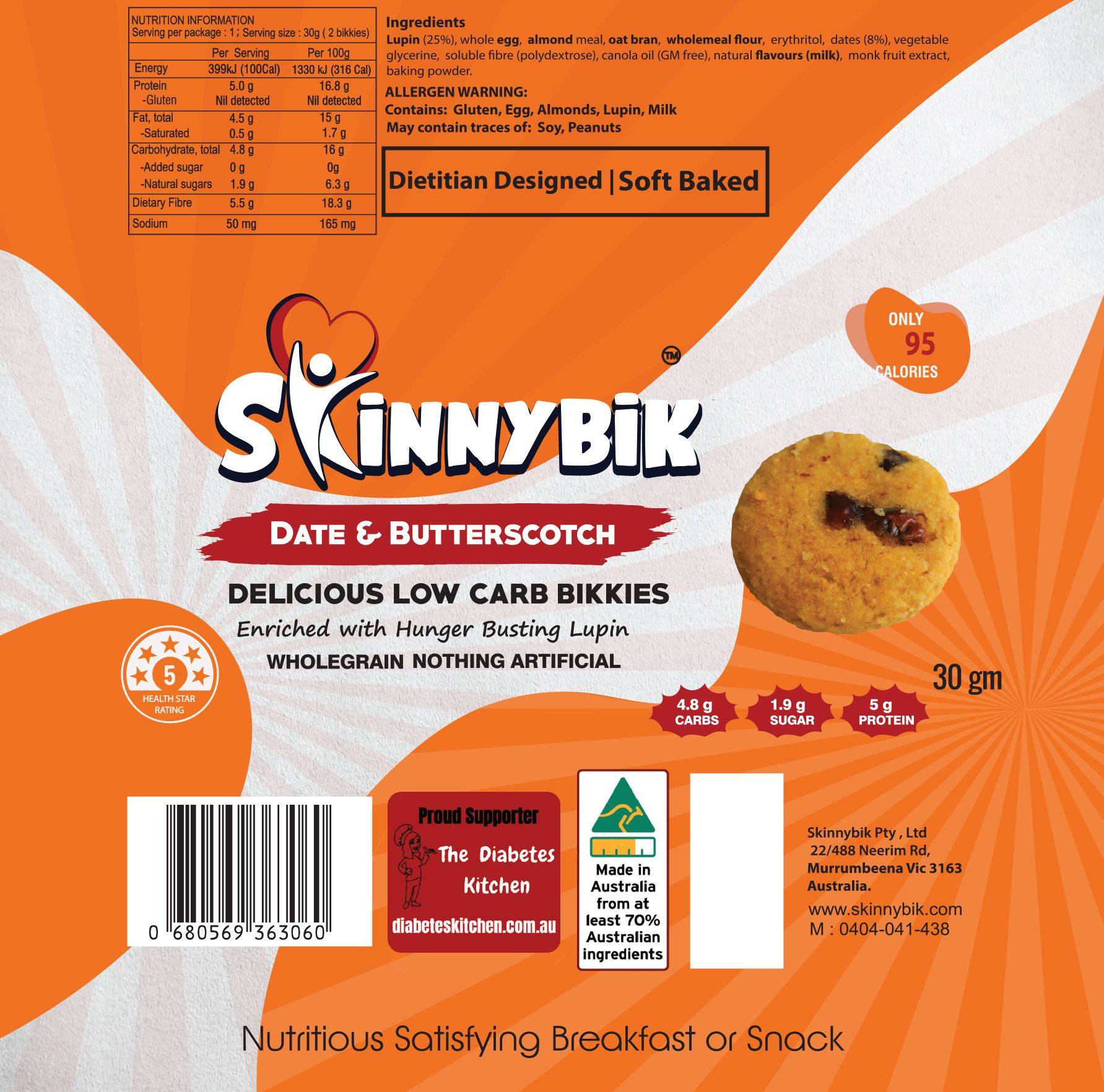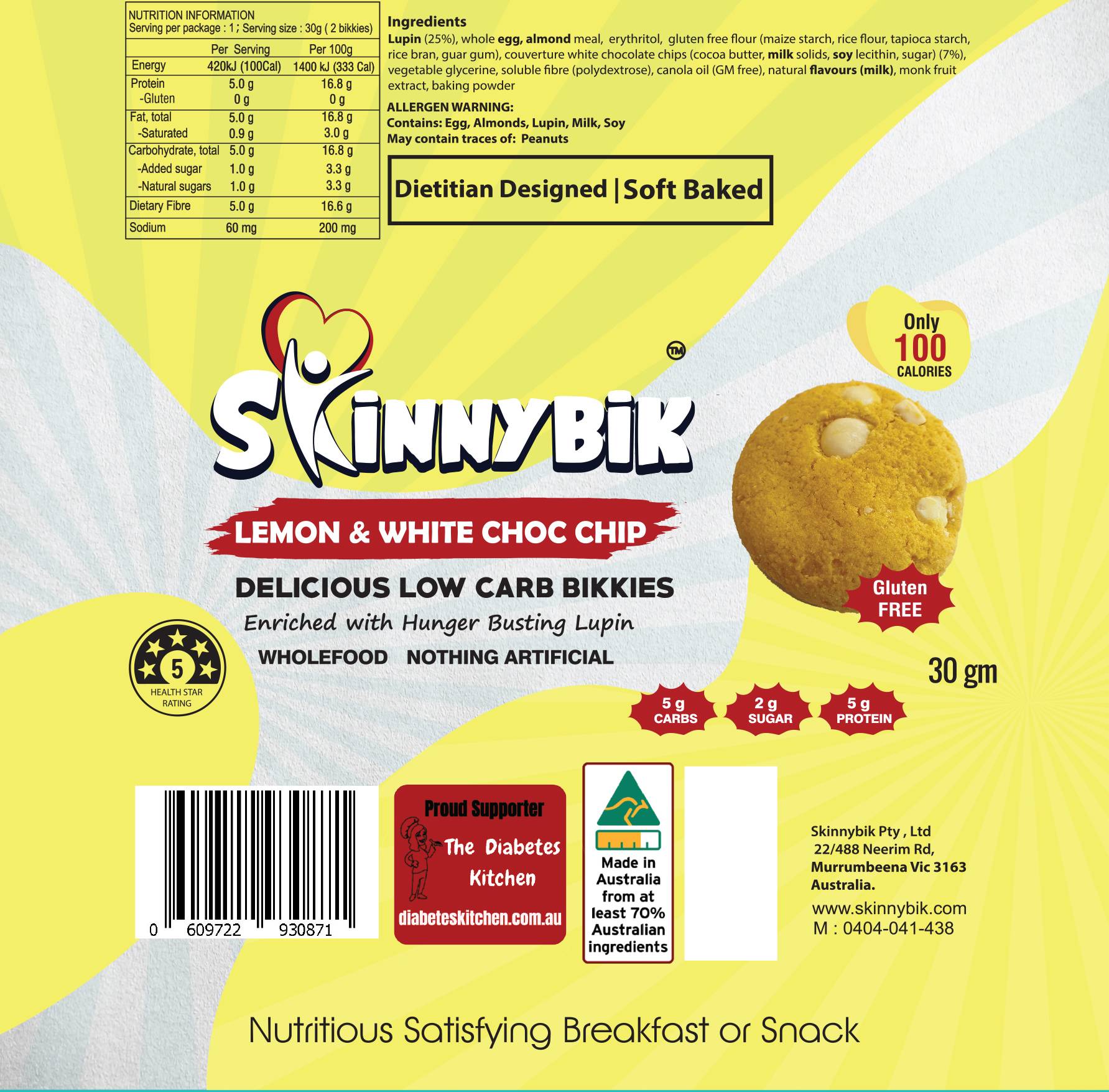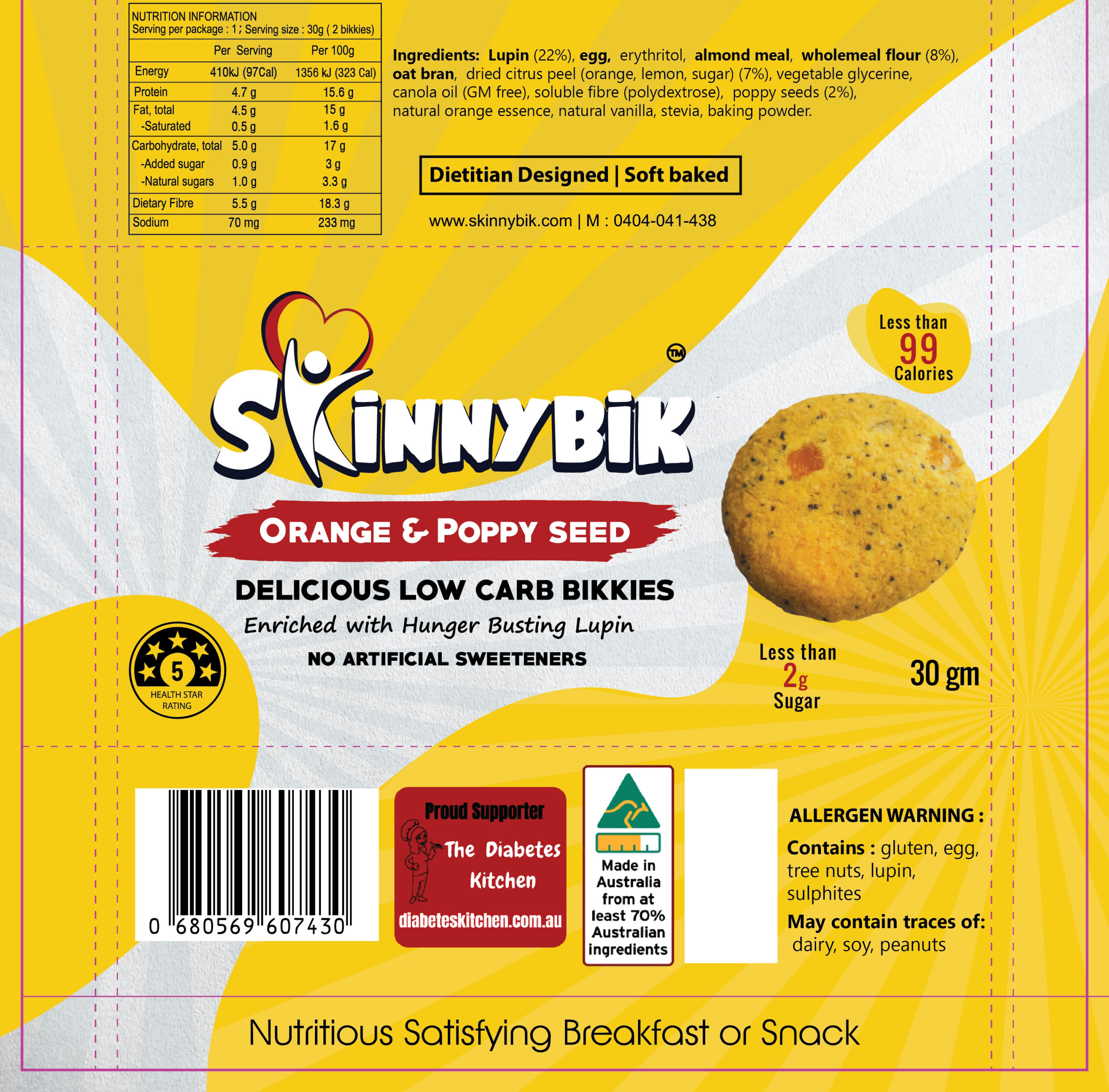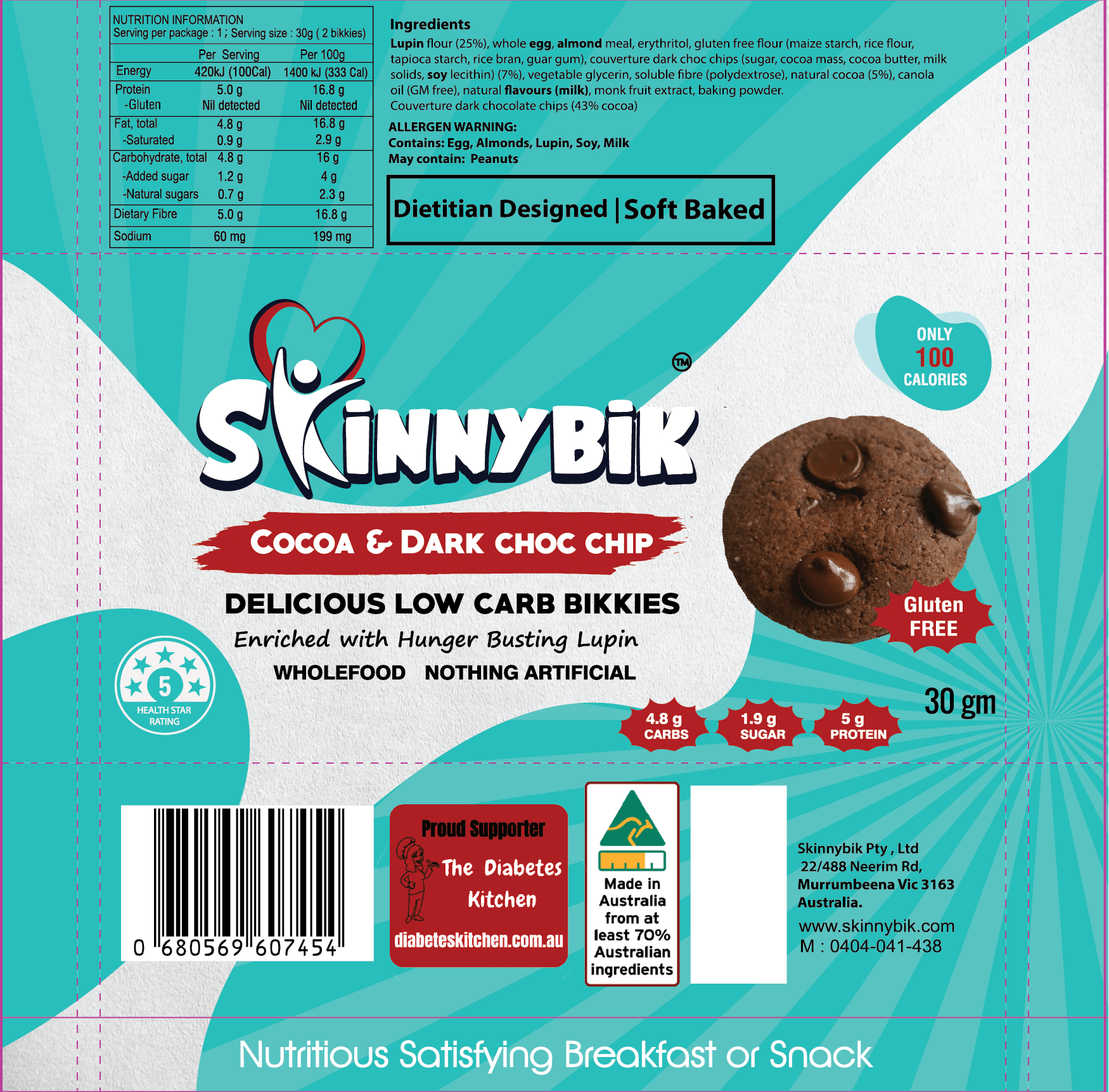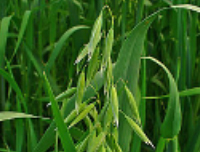Skinnybik NIPs
For ingredients per-product, click the respective links below and scroll down to ‘nutritional information’.
Date & Butterscotch | Cocoa & Dark Choc Chip | Cranberry & Coconut | Orange & Poppyseed | Lemon & White Choc Chip | Cocoa & Coconut
Keto
Low Carb
Skinnybik Ingredients
Skinnybik range has been carefully designed by Dr Antigone Kouris, nutrition scientist and clinical dietitian, using her 30 years of nutrition expertise. She has selected whole food ingredients inspired by the Mediterranean diet that are known to provide many health benefits; including reducing hunger, providing slow release energy and helping to nourish your body and your gut microbiome. Several of the ingredients used are also natural appetite suppressants.
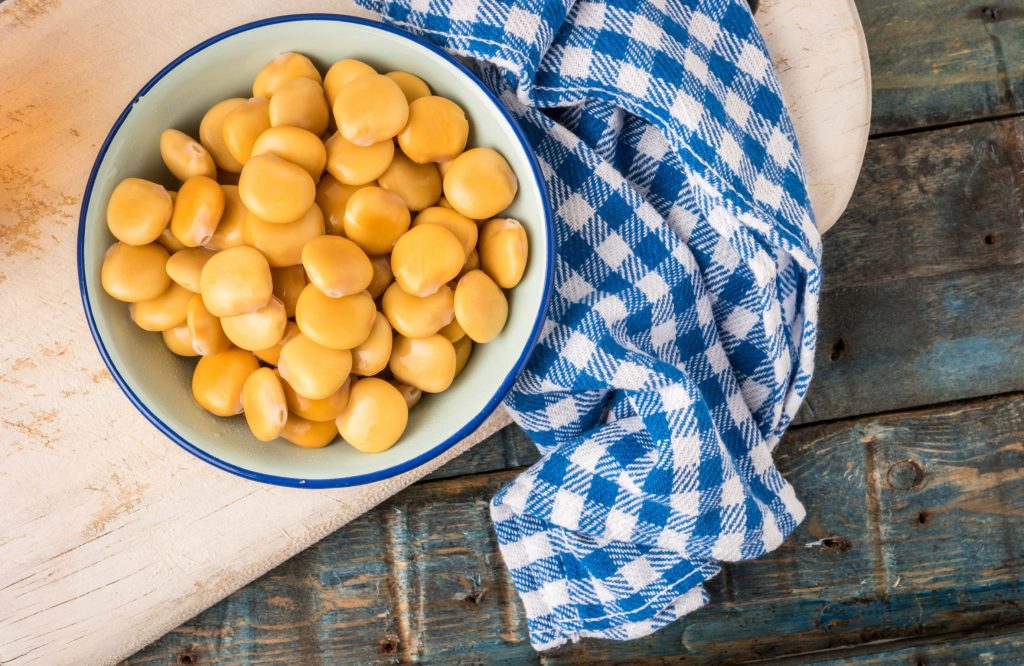
Lupin Flour
Lupins are “beans” and belong to the legume family along with lentils, chickpeas, kidney beans etc. However they are nutritionally superior to other legumes (being much higher in plant protein, fibre, nutrients and much lower in carbs) and have some super health benefits. Lupins are natural appetite suppressants. They may also help to regulate blood sugars, lower cholesterol, blood pressure and improve your gut microbiome.

Almonds
Almonds are high in plant protein, fibre, healthy fats, antioxidants, vitamins, minerals, but are low in carbs. Almonds are natural appetite suppressants and can help reduce weight, blood pressure, cholesterol and improve insulin resistance.
- Almonds are highly nutritious and rich in healthy fats, antioxidants, vitamins and minerals.
- It is important to note that your body does not absorb 10–15% of their calories because some of the fat is inaccessible to digestive enzymes.
- Almonds are a great source of vitamin E, copper, magnesium, and are high in plant
protein (6 g in half a cup). - They are low in carbs but contain high levels of healthy unsaturated fatty acids.
- Almonds are also loaded in antioxidants (especially in the skin) which can help reduce inflammation and oxidation of cholesterol.
- The health benefits of almonds include improved insulin resistance, reduced blood pressure and lower cholesterol levels.
- Like lupin, they are a natural appetite suppressant and may help with weight loss
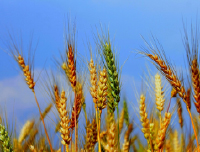
Wholemeal Flour
Wholemeal flour is high in plant protein, minerals, antioxidants, phytosterols, prebiotic fibre and antioxidant polyphenols. Wholegrains can help lower the risk of developing diabetes, heart disease, high blood pressure and bowel cancer.
- Whole grains are associated with various health benefits, including a lower risk of diabetes, heart disease, and high blood pressure.
- Whole meal flour is considered to be a whole grain food.
- It is made by grinding the entire wheat kernel (containing the nutrient rich bran and germ) into a powder.
- It is high in plant protein at 8g/half cup (similar to oat bran and quinoa!)
- It is high in fibre, iron, zinc, magnesium, potassium and thiamin.
- It is high in antioxidants (phytic acid, lignans, ferulic acid, sulfur compounds), prebiotic polyphenols (good for the microbiome) and phytosterols (lowers cholesterol).
- However, it contains gluten which is not suitable for people with coeliac disease
- Skinnybik contain about 10% whole meal flour
- There is a misconception that commercial “gluten free flour” is healthier than whole meal flour. The former contains very little protein, fibre, nutrients and is high in refined starch due to the rice flour, corn starch and tapioca starch blend used.
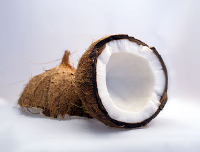
Coconut Meal
Coconut meat is high in fibre, antioxidant polyphenols, minerals, saturated fat and is low in carbs. It is a natural appetite suppressant and may help with weight loss and blood sugar control. More research is needed on how it affects the gut microbiome, cholesterol and heart disease.
- Coconut is a unique fruit because of its high fat content.
- Around 89% of the fat in its meat is saturated. Most of the saturated fat is in the form of medium-chain triglycerides (MCTs).
- The body metabolizes MCTs differently than other types of fats. They are absorbed directly from the small intestine and rapidly used for energy.
- One review on the benefits of MCTs in people with obesity found MCTs may promote body fat loss when eaten in place of long-chain saturated fats from animal foods.
- MCTs in this fruit may promote feelings of fullness, calorie burning, and fat burning and may improve the gut microbiome.
- Coconut meat is high in fibre (9%) and antioxidant polyphenols, low in carbs (15%) and is nutrient dense (contains manganese, copper, selenium, phosphorus, potassium, magnesium, zinc and iron).
- A 90-day study in 8 adults found that supplementing a standard diet with 1.3 cups (100 grams) of fresh coconut daily caused significant weight loss, compared with supplementing with the same amount of peanuts or peantut oil
- Coconut meat may also help blood sugarcontrol by improving gut bacteria.
- There still isn’t much good-quality research on coconut, cholesterol, and heart disease.

Eggs
Eggs are very nutrient dense – they are high in vitamins, minerals, antioxidants, high-quality protein, good fats, cholesterol and choline. Eggs are natural appetite suppressants and can help with weight loss. They have not been linked to heart disease or raised cholesterol but are important for eye and brain health.
- Eggs are so nutrient dense that they’re often referred to as “nature’s multivitamin.”
- Eggs are high in vitamins, minerals, high-quality protein, good fats and various other lesser-known nutrients.
- A large egg contains 77 calories, with 6 grams of quality protein, 5 grams of fat and negligible carbohydrates.
- Almost all the nutrients are contained in the yolk – the white contains only protein.
- Eggs have not been linked to heart disease or elevated cholesterol.
- Eggs are a rich source of choline which is important for the brain.
- Like lupin, eggs are a natural appetite suppressant and can help one eat fewer overall calories.
- Eggs are particularly rich in the two antioxidants lutein and zeaxanthin important for eye health

Dates
Dates: Of all the dried fruit, dates are one of the richest sources of antioxidants. Despite their calories and sugar content, dates are high in minerals and fiber. They have a low glycaemic index and appear to have a minimal effect on blood sugars.
- Dates have an excellent nutrition profile.
- Despite their calories and sugar content, dates contain some important minerals (potassium, magnesium, iron) in addition to a significant amount of fiber
- Of all the dried fruit, they are one of the richest sources of antioxidants (flavanoids, carotenoids, phenolic acid), contributing to reduced inflammation in the body that may help prevent the development of certain chronic illnesses, such as heart disease, cancer, Alzheimer’s and diabetes.
- They have a low glycaemic index due to the fibre and antioxidants and have been found to have a minimal effect on blood sugars in human studies.

Cranberries
Cranberries are high in carbs, fibre, vitamins, minerals and are very high in antioxidants. The antioxidants are well known for their ability to reduce urinary tract infections, but may also help lower cholesterol and blood pressure.
- Cranberries are related to blueberries, bilberries, and lingonberries.
- They are primarily made up of carbs and fiber. They also boast several vitamins and minerals, including manganese, copper, and vitamins C, E, and K1.
- They are very high in bioactive plant compounds and antioxidants— particularly flavonol polyphenols such as quercetin, myricetin, peonidin, ursolic acid and
- Proanthocyanidins help reduce urinary tract infections and H pylori infections (which can increase risk of stomach cancer).
- Anthocyanins, proanthocyanidins, and quercetin may be beneficial for heart health by lowering cholesterol, blood pressure and homocysteine.

Cocoa
Cocoa and dark chocolate have more antioxidants than many other fruits (including berries). They are also rich in minerals. They can reduce the oxidation of cholesterol, lower blood pressure, reduce inflammation, and improve insulin sensitivity, cognition and mood. Both are natural appetite suppressants, with regular consumption associated with a lower body weight – but more studies needed!
- Cocoa powder is made by crushing cocoa beans and removing the fat or cocoa butter.
- Cocoa is rich in antioxidant polyphenols, selenium, potassium, zinc, magnesium, chromium, iron and manganese.
- Cocoa and dark chocolate have more antioxidant activity (mainly from polyphenols) than many other fruits, including blueberries and acai berries.
- Processing and heating cocoa can result in a decrease in antioxidants.
- Cocoa is usually treated with alkaline (known as the “Dutching” process) to reduce bitterness, which results in a 60% decrease in polyphenols.
- Undutched cocoa (also called “Natural cocoa”) used in Skinnybik is not treated with alkaline and therefore has much higher levels of polyphenols.
- Couverture dark chocolate (used in Skinnybik) is considered to be healthier and better quality than compounded chocolate because it contains premium cocoa beans and retains the natural cocoa fat (butter). Compounded chocolate replaces the cocoa fat with unhealthy hydrogenated vegetable fat high in trans fats.
- Dark chocolate is also richer in polyphenols than milk/compounded chocolate.
- They can reduce the oxidation of cholesterol, lower blood pressure, reduce inflammation, improve insulin sensitivity, cognition and mood
- Regular consumption of cocoa and dark chocolate is associated with a lower body weight! Yeah! Like lupin, they can reduce appetite and increase feelings of fullness however further studies are needed as to whether they can help with weight loss.
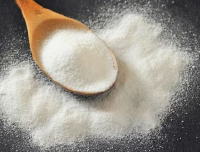
Polydextrose
Polydextrose is a form of soluble dietary fibre derived from corn. It is a natural appetite suppressant, has a very low glycaemic index and may reduce blood sugars. It does not cause bloating and flatulence and stimulates the growth of beneficial bacteria in the large bowel.
- Polydextrose is a form of soluble dietary fibre derived from corn and is good for digestive health.
- Like lupin, it is a natural appetite suppressant, boosts feelings of fullness and reduces energy intake at the subsequent meal
- It’s a prebiotic,which means it is fermented in the large bowel, stimulating the growth of beneficial bacteria such as bifidobacteria and lactobaccili.
- it promotes the generation of short chain fatty acids including propionic and butyric acids which have specifically documented colonic health benefits
- it enhances carbohydrate fermentation which helps to reduce colonic pH (a good thing!)
- it does not cause bloating and flatulence like some other fibres
- like lupin it has a very low glycaemic index (<7) and may reduce glucose absorption from the small intestine; a study showed that it may reduce postprandial blood glucose and insulin responses in people with type 2 diabetes
- it enhances mineral absorption from the colon
- is a natural preservative

Stevia
Stevia is a popular sugar substitute and is considered safe by regulatory bodies. It is a natural sweetener derived from a plant, has almost zero calories and is 250 times sweeter than sugar. It can help reduce energy intake and can increase feelings of fullness. It is inconclusive if stevia lowers blood sugars and blood pressure and whether it is safe for children, pregnant and lactating women.
- Stevia is a natural nonnutritive sweetener derived from the stevia rebaudiana plant and is considered safe by regulatory bodies.
- Stevia contains very few calories or carbs but is 250 times sweeter than sugar.
- Stevia may lower blood sugars and blood pressure. More studies are needed.
- Stevia may have an additive effect with diabetes and blood pressure medications.
- There is not enough reliable information about the safety of taking stevia if you are pregnant or breast feeding and in children.
- May cause a feeling of fullness.
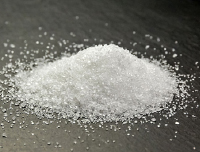
Erythritol
Erythritol is a sugar alcohol and is made by fermenting corn. It has 70% the sweetness of sugar and is a natural appetite suppressant. It is unique from other sugar alcohols (mannitol, sorbitol and xylitol ) as it contains zero calories, does not raise blood sugars and is less likely to cause bloating and diarrhoea.
- Erythritol is a naturally derived sugar alcohol that can be found in many fruits and vegetables and can also be made by fermenting corn. It has 70% of the sweetness of sugar.
- Unlike other sugar alcohols (like mannitol, sorbitol and xylitol) , erythritol does not contain calories, does not raise blood sugars or insulin and is less likely to cause bloating, diarrhoea or microbiome disturbance in the colon as it is absorbed in the small intestine.
- Studies in which animals are fed massive amounts for long periods of time show
no adverse effects. - Like lupin, it is a natural appetite suppressant.

Canola Oil
Canola Oil: Dr Kouris was very keen to use extra virgin olive oil in her bikkies, but this would have increased the cost significantly. So she opted for second best – GM free canola oil. This oil is low in saturated fat and high in monounsaturated fat like olive oil. It is also high in plant omega 3 and omega 6 fats and phytosterols. It has been shown to significantly reduce the risk of heart disease.
- Canola oil is generally considered a “healthy” oil because it is very low in saturated fat (7%) and high in monounsaturated fat (62%) like olive oil.
- Is high in plant omega-3 linolenic acid fat (9%) (not found in olive oil) which may reduce fracture risk and protect against heart disease and diabetes.
- Is high in omega-6 linoleic acid (19%) and phytosterols (0.9%) which can lower cholesterol.
However canola does not contain antioxidant polyphenols like olive oil. - Is high in vitamin E and K.
- A landmark randomized control study in France in the 1990s (Lyon Heart Study) showed that a Mediterranean diet rich in canola oil significantly reduced the risk of heart disease
